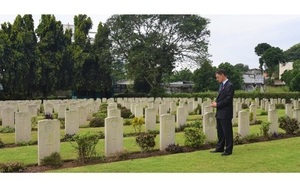British High Commission in Sri Lanka marks Remembrance Day
The British High Commission in Colombo marked Remembrance Day with a commemoration ceremony on 11th November 2018 at the Liveramentu Commonwealth War Graves in Colombo.

British High Commissioner to Colombo James Dauris at the Liveramentu Commonwealth War Graves
Armistice Day marks the 100th anniversary of the cessation of hostilities between the allies and Germany in World War One, while Remembrance Sunday marks the remembrance of all those who’ve lost their lives in combat since World War One. Both occasions fall on the same day this year.
A the commemoration ceremony, Buglers from the Sri Lanka Army played “Last Post” and “Reveille” marking the beginning and end of two minutes silence and placing of wreaths.
Ven. Perry Brohier, Archdeacon of Colombo led prayers and spoke at the event, which was attended by representatives of the Diplomatic Corps, the War Veterans’ Association of Sri Lanka, other Sri Lankan organisations and members of the British and other Commonwealth communities in Sri Lanka.
Readings were from British High Commissioner James Dauris, Australian High Commissioner Bryce Hutchesson, Defence Advisor (Designate) of the British High Commission Colonel David Ashman, Commander of the Sri Lanka Navy Vice Admiral S S Ranasinghe, Canadian High Commissioner David McKinnon and President of the Sri Lanka Ex-Servicemen’s Association Brigadier K A Gnanaweera.
Remembrance Day is marked all around the world, as an occasion to reflect on both loss and sacrifice, but also peace and reconciliation. For almost a century Remembrance Day ceremonies have been held around the world on 11th November, the date on which the Armistice was signed, formally bringing World War One to an end in 1918. On Remembrance Day, people who have served and died in both World Wars and in many other more recent conflicts are remembered.
More than four hundred Sri Lankan servicemen lost their lives in World War One, a conflict in which its effects were felt around the globe. It is estimated that the total number of military and civilian casualties in World War One was around 40 million. There were 20 million deaths and 21 million people were wounded. The dead included almost an equal number of military personnel and civilians.